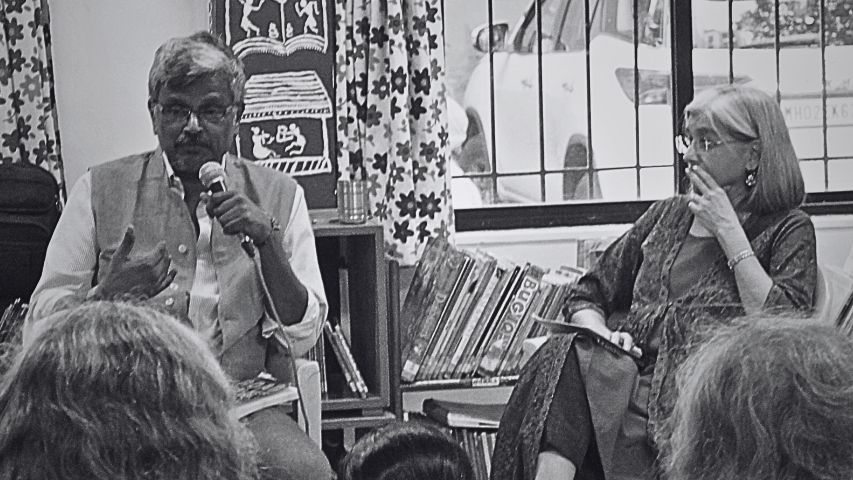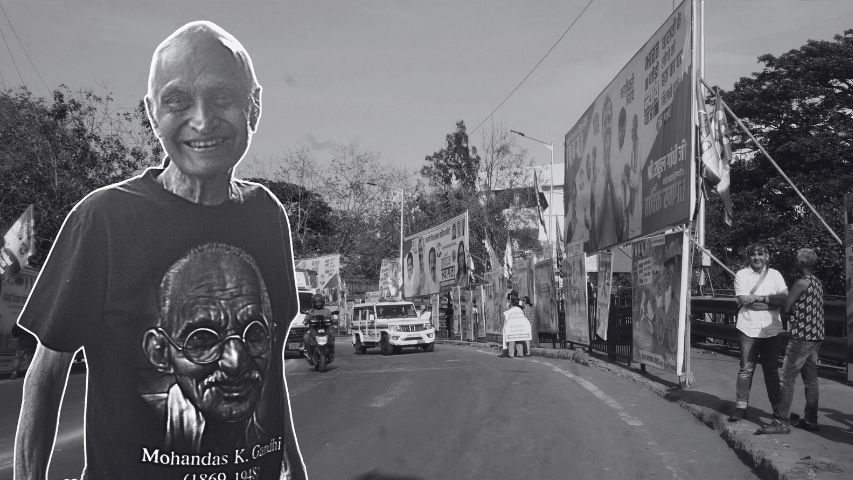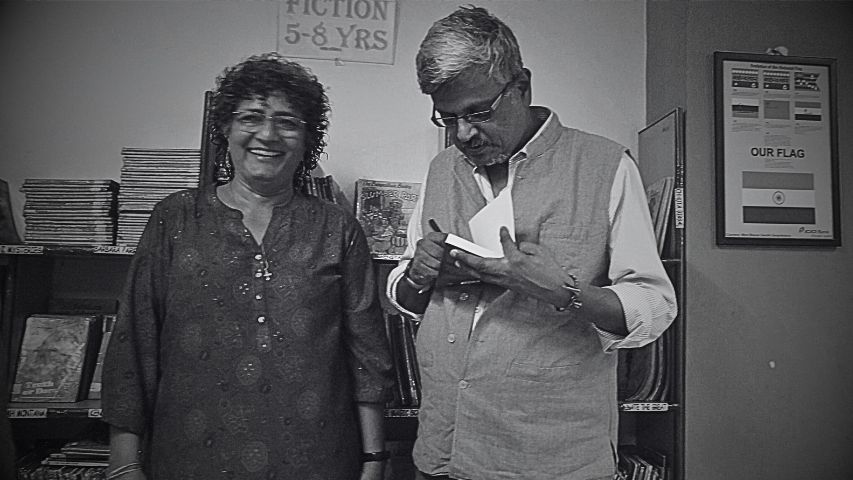-853X543.jpg)
POWERFUL PEOPLE: A FEW MILES ON THE BHARAT JODO YATRA
by Vinta Nanda April 9 2024, 12:00 am Estimated Reading Time: 7 mins, 16 secsMumbai-based writer and journalist Dilip D'Souza, celebrated for his incisive commentary on social and political issues, engages in a dialogue with Vinta Nanda regarding his participation in the transformative Bharat Jodo Yatra and his subsequent literary endeavour, "Road Walker."
D'Souza's illustrious career spans across platforms such as The Sunday Observer, Rediff.com, Outlook, Mid-Day, Hindustan Times, indiatogether.org, The Caravan, and various other publications. His contributions have garnered numerous accolades, including the prestigious Daily Beast Award for South Asian Commentary, the Statesman Rural Reporting Award, the Times of India/Red Cross Prize, the Outlook/Picador Nonfiction Prize, the Sanctuary Magazine Prize, among others.
Immersing himself in the Bharat Jodo Yatra on four separate occasions, Dilip's latest book, "Road Walker – a few miles on the Bharat Jodo Yatra," intricately weaves the narrative of his encounters and revelations during these journeys. Beyond mere recounting, it encapsulates his discovery of newfound vigour, empathy, and optimism within the folds of the Yatra. Reflecting on the monumental expanse of India traversed during the journey, Dilip muses on the lingering impact of the experience, grappling with the question of when such an opportunity might arise again.
As he navigated the challenges, Dilip found himself confronting his own memories and convictions, extracting fresh insights about his nation, his heritage, and his identity. He arrived at a realization - that every step taken is a testament to his own personal narrative, an opportunity to etch his own slice of history. For Dilip, this revelation transcends the physical bounds of the Yatra, embodying a deeply personal and transformative journey of self-realization.

Over to my conversation with him…
Why do you believe the Bharat Jodo Yatra (BJY) was important for Rahul Gandhi to take?
For several years now, the Congress has been floundering - losing elections, losing members, searching for a message that will resonate. I think it's taken a toll on the spirit of the rank and file in the party. So there was a need for something to shake things up, to rejuvenate flagging spirits, to bring the Congress back to public conversations. I believe that's what threw up the idea of the BJY.
I think it was important because a democracy suffers with a rampant ruling party and a demoralized opposition. I don't know about what will happen at election time, but I think it was very important for Rahul Gandhi and the Congress to send out a message that they were very much politically alive, willing to fight for their idea of India.
Which were the parts of India that you joined the yatra and why?
I joined four times - in Karnataka, Rajasthan, Punjab, and Kashmir. Karnataka, because by the time I got mentally and physically prepared to join, a few weeks had passed since the start of the Yatra, and it had reached there already. But it was also good because we joined as it passed relatively close to Bangalore - making the task of reaching the Yatra a little easier.
After that stint in Karnataka, I had a few other commitments and could not join for a couple of months. By the time I could do it again, the Yatra was in Rajasthan.
After that I had some more commitments and could not join till Punjab. Again, I joined from Ambala where I knew someone and that made it easier.
Finally, Kashmir because I wanted to be there as the Yatra ended. I wanted to witness how the Yatra would fare in that state, which had been a focus of much discussion, and because of Kashmir's meaning to the idea and reality of India.
How would you describe the spirit of the yatra which you were a part of?
Optimistic, cheerful, curious, open-eyed, realistic. All that applied. The sheer feeling of being with so many other walkers, in the middle of these huge crowds, meant a rush of adrenaline that I think everyone around me felt.

As a journalist, please share some observations about the difference between the ground realities while you travelled and what is being reported in mainstream media on a daily basis?
The only thing I might suggest in this direction is that the early days of the Yatra saw not a whole lot of coverage. That's partly because of years of hearing that Rahul Gandhi is a "pappu", partly because it was seen as a gimmick, partly because nobody expected it would really continue as planned. But within a few weeks, all that changed. It was no longer possible to assume it would fold, or that Rahul would not walk all the way. Because he and his fellow yatris were doing 25+km every day, without fail, and at a cracking pace. And meeting all kinds of people on the way.
So at that point I think the media did start covering the Yatra. They may not have caught the nuances that people on the Yatra did, as they walked - but interestingly, there were so many accounts from people who joined and walked. Those told the story well.
What are the checks and balances you believe governments need to put in place to ensure that the media is independent and fulfils its responsibility as the fourth pillar of democracy?
I don't think there are things one can "put in place" that governments won't overturn when convenient. So I think the media has to work to ensure its own independence. How? By this simple mantra: never stop asking questions. That is its role in a democracy. When "journalists" stop doing that, governments know they can overrun the media.
Tell us about your personal process while writing the book and the materials and research that you leaned on during the time of writing?
The book is a very personal memoir. For me, the Yatra was a physical and mental challenge, and I tried to capture that in writing the book. But more than that, and almost to my surprise, it got me to reflect on a number of things in my life – personally, political, if you like. And I tried to capture that, too, in the writing.
All of which means that I really relied mostly on my notes and memories, but also on conversations with people I met and got to know on the Yatra, and spoke to later if necessary.
Any thoughts about the Bharat Jodo Nyay Yatra – you didn’t travel with it but have been an observer, so do share your views.
Not too much to say, precisely because I was not able to join except on the last two days, in Bombay. It was inevitably a lower-key affair, partly because there was no longer the novelty of the BJY, partly because much of this Yatra happened on wheels. But certainly in those last two days I felt the same spirit of the first Yatra.

Tell us a few responses you have received from readers of your book and why you cherish them and believe Indians in general have faith in their democracy?
The response from readers has been gratifying, because I think they caught the spirit in which I wrote the book. For example, one person who read it sent me these lines: "I think what adds an extra layer is the autobiographical element - particularly the going back to your experiences, becoming politically aware, the long history of violence you have seen yourself, as well as the police thuggery and the impunity. The suspense that builds up - will the Yatra walk through Kashmir or not - was brilliant! I think, through Avani, and through the whole experience of the Yatra, the issue of what is the meaning of politics emerges - not party politics, not elections but the coming together, talking, exchanging ideas, agreeing, disagreeing, building a sense of solidarity when people act collectively not to fight against (or not only) but to fight for something - and the joy people can feel at the prospect of governing themselves. It is a beautiful take on the ‘promise of politics’, the hope we can have in it, even though the hopes do so often get dashed."
Another reader said this: "I felt your excitement and emotions. The people you met covered a gamut of backgrounds and motives for walking. In reading the book, I believe the yatra can, and dare I say, will bring healing in some form. I wish him (Rahul Gandhi) the best of luck in turning the tide against hate." How can I not have faith in the promise of democracy after responses like those?
You can buy Road Walker here: https://www.amazon.in/Roadwalker-Miles-Bharat-Jodo-Yatra/dp/0143463411
A short film by Emma Crouch




-173X130.jpg)
-173X130.jpg)
-173X130.jpg)

-173X130.jpg)
-173X130.jpg)
-173X130.jpg)
-173X130.jpg)